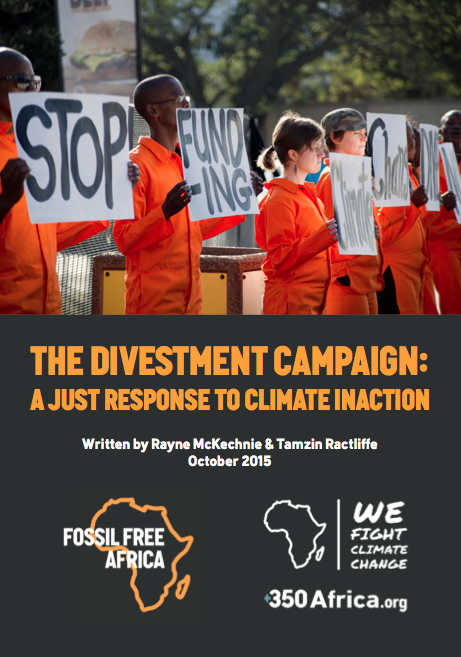 Today, 350Africa.org is launching the second in a series of powerful research reports to present the case for divestment from fossil fuels and to highlight that this is not just an environmental issue but a political, economic and moral one as well. The divestment movement is growing globally, with over 450 institutions, pension funds, universities and faith-based organisations having committed to divest, including the World Council of Churches.
Today, 350Africa.org is launching the second in a series of powerful research reports to present the case for divestment from fossil fuels and to highlight that this is not just an environmental issue but a political, economic and moral one as well. The divestment movement is growing globally, with over 450 institutions, pension funds, universities and faith-based organisations having committed to divest, including the World Council of Churches.
Divestment is not new to South Africa. It was a central component of the anti-apartheid sanctions campaign and proved to be a hugely important tactic against the apartheid regime and those that supported it.
Divestment was directed against apartheid was significant for two reasons. First, to highlight the individual and collective moral imperative to oppose apartheid itself and second, to expose the apartheid system as inherently unsustainable and destructive to the majority of the people and the country. As such, the divestment movement empowered ordinary citizens and individuals around the world to voice their opposition to an oppressive and unjust system, to place economic and social pressure on those who invested in it, and to become involved in a bigger movement for change.
The same thing can now be said of the fossil fuel divestment movement. Its motivations are strikingly parallel: a moral imperative to act against those who profit from exploitation and societal destruction; and to mobilise climate justice fighters across the world to take individual and collective action.
The climate change crisis is one of the biggest challenges of our time. We are increasingly experiencing devastating floods, drought and rising temperatures, which are felt through (amongst other things) water shortages, food price hikes and increasing numbers of climate migrants. Crucially for those who live in Africa and the Arab world, the science and material reality consistently shows that the effects of climate change are hitting this part of our world the hardest.
The fossil fuel divestment movement stands for a just transition away from dirty and harmful fossil fuel energy. In particular, 350Africa.org is calling on banks in South Africa to disclose exactly how much they invest in coal, oil and gas and commit to stop any future funding of fossil fuel projects. These banks claim that they practice corporate sustainability and are proud to speak of how green they are with zero emissions operations yet at the same time they invest billions of Rand in fossil-fuel refineries, mines and power-stations across Africa.
Fossil fuels are fast becoming developmental dinosaurs. Our future is in clean, renewable sources of energy but we must act now!
Archbishop Desmond Tutu was one of the highest profile supporters of the anti-apartheid divestment movement and today he has once again come to the fore in support of the global fossil fuel divestment movement. He has stated that the destruction of the earth’s environment is the human rights challenge of our time and that “people of conscience need to break their ties with corporations financing the injustice of climate change,”
Now is the time for action! The divestment movement of the 21st century gives each one of us an opportunity to make a difference and become climate fighters for developmental justice. Join us!
(And click here to read the report on how we can develop South Africa with renewable energy after we’ve ditched all the fossil fuel investments.)
